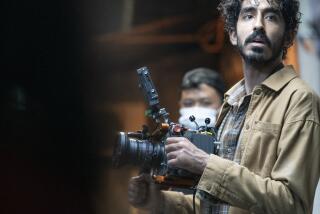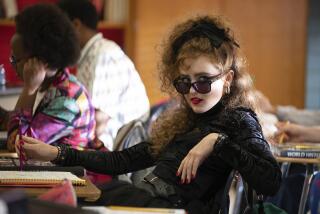Must Reads: The ending of ‘Us’: Jordan Peele on who the real villains are
If you were among the scores of moviegoers who helped push “Us” to a record-breaking $71.1 million debut over the weekend, then now you know: The real villains in Jordan Peele’s smash horror hit aren’t quite who — or what — they seem.
Warning: The following includes spoilers for the new horror film “Us.”
Fans making sense of the twisty ending of “Us” are busy decoding its dense array of symbolism, from all those white rabbits to the number 11, which pops up in multiples everywhere from the Giants game on TV to the ominously referenced “Jeremiah 11:11” Bible passage portending destruction, scrawled on the homemade sign of a local beach bum.
Peele’s follow-up to his Oscar-winning directorial debut spins an even more ambitious yarn than “Get Out,” in which an African American man (Daniel Kaluuya) found himself fighting his way out of The Sunken Place, a subconscious prison borne of toxic white liberalism.
In the spooky prologue to “Us,” 9-year-old Adelaide Wilson (Madison Curry) visits the Santa Cruz Beach Boardwalk one night in 1986 with her parents only to wander off alone into a funhouse of mirrors — where she comes face to face with her own evil twin.
Fast-forward to the present. The now-adult Adelaide (Lupita Nyong’o), still haunted by that night, sees her greatest fears come to life when she and her family — husband Gabe (Winston Duke), daughter Zora (Shahadi Wright Joseph) and son Jason (Evan Alex) — are attacked by doppelgängers in red jumpsuits who appear in their driveway, armed with brass scissors.
The best monster movies ... allow their villains to have these different layers. You are meant to be terrified ... but also to relate to them on some level.
— Jordan Peele, writer/director of “Us”
But as the film unfolds, what writer-director Peele reveals of the scope of their plans and the world of “Us” becomes even more terrifying, tragic and pointed. The doppelgängers hunting the Wilsons are part of a much larger movement of bloodthirsty invaders dubbed the Tethered.
The Tyler family, white friends of the Wilsons, have their own demented doubles. So too, it seems, does everyone in town. These attackers have suddenly appeared out of the depths to launch a brutal, bloody mass invasion, and there is a very specific motivation behind their madness. But why?
Adelaide, played masterfully by Nyong’o, harbors her own childhood traumas and secrets; deep down, she’s always known this day would come. As the Wilson family is terrorized in their own home, Adelaide demands to know just what these shadowy invaders are.
Her Tethered twin, the maniacal matriarch Red (also Nyong’o), replies with a deranged half-smile: “We are… Americans.”
Ahead of the film’s release, Peele, Nyong’o and Duke tiptoed into spoiler territory with The Times, discussing how their cinematic Rorschach test asks moviegoers to morally recalibrate their own perspectives after they leave the theater.
Influences
“I wanted to make a monster movie, and in the best monster movies, the Universal monster movies, they allow their villains to have these different layers and to be multidimensional,” said Peele. “Frankenstein, the Creature from the Black Lagoon, even [David] Cronenberg’s the Fly — you are meant to be terrified of these things, but also to relate to them on some level.”
Peele says “Us” was inspired by the division and xenophobia he observed in post-election America and the notion that “the feeling that we all feel we are the good guy in our own story prevents us from facing our demons.”
Smashing box office records upon release and nearly doubling analysts’ opening weekend projections, “Us” left audiences buzzing after scoring the best first weekend for a live-action original since 2009’s “Avatar.”
And while you might still be scratching your head over exactly how the sci-fi rules of “Us” work — Who was controlling whom during that fateful ballet performance? Where did the Tethered get all those scissors, anyway? — its core themes haunt long after the credits roll.
The Mythology
REVIEW: The evil is ‘Us’ in Jordan Peele’s smart, relentlessly scary follow-up to ‘Get Out’ »
The first piece of the “Us” puzzle is presented when Red explains that the Tethered are copies created as part of a failed government mind-control experiment — denied their own free will, imprisoned in underground tunnels, doomed to mimic the lives and every move of their blissfully ignorant primaries above ground.
It’s a tragic back story, and one that Duke, who plays both Adelaide’s status-obsessed husband Gabe and Red’s brutish Tethered partner Abraham, dove into while preparing his take on the two characters.
“We got into the weeds on Gabe, and it was really exciting — Jordan immediately was like, ‘We’re going to challenge perceptions of masculinity with this character while breaking down some societal norms of how you look at a father,’” Duke said. “I never saw Abraham as a villain. I saw him as a good man, actually, and as a hero … from his point of view.”
The Tethered are really after one thing, said Nyong’o: “Justice.”
“They wanted justice,” Duke agreed. “They were enacting a revolution.” A scene in which Abraham steals Gabe’s eyeglasses and peers through them, seeing clearly for the first time in his life, helped Duke underscore the haves vs. have-nots juxtaposition between his characters.
In my mind it is quite large and expansive ... I won’t give the borders, but there are ... means down there.
— Jordan Peele on the Underpass in “Us”
“The glasses moment in the film was really powerful for me, because [Abraham] is defined by all the things that he doesn’t have as opposed to Gabe,” he said. “Gabe is defined to me by his comfort, by his luxury, by the privileges that he lives in and his possessions. From his perspective he has a trophy wife and the perfect American experience: the boat, the house, the summer vacation, the rich friends, the proximity to richness and the American Dream in its full manifestation.
“Abraham is on the other end of the spectrum for me, because he is on the outside of that,” continued Duke. “He is an outsider. He doesn’t get healthcare. He doesn’t get glasses. He doesn’t get a voice.”
The ranks of the Tethered seemingly stretch far across the continental United States. Just how far is one of the film’s lingering unknowns. Peele remains enigmatic concerning some of the questions viewers may have about the mythology of “Us,” but insists that explanations exist beyond what is seen in the film.
“As far as the location where they come from, which is called the Underpass, I don’t tell you how large and how expansive it is — and in my mind it is quite large and expansive,” teased Peele, who will next host and executive produce the upcoming CBS All Access “Twilight Zone” revival. “I won’t give the borders, but there are … means down there.”
The Big Twist
RELATED: Jordan Peele wants Americans to ‘face their demons’ in new home-invasion horror film »
Only at the end, after taking viewers through “Us” via Adelaide’s eyes, does the film deliver its most provocative twist: In flashback, it’s revealed that the real Adelaide was attacked as a child inside the funhouse in 1986 and replaced by her Tethered doppelgänger, who imprisoned her below and assumed her identity above. It was that doppelgänger who grew up to be the impostor Adelaide we have followed over the course of the film.
Both Adelaide and Red are the heroes of their own stories. But both are also survivors who have committed unconscionable acts borne of desperation, even murder. Who gets to walk away the hero? Peele says that hierarchies of privilege were a major theme he discussed with Nyong’o and Duke in their first conversations about the project.
“We don’t generally acknowledge, and we tend to neglect, the fact that people have to and have had to suffer in order for us to have the privileges we have,” said Peele.
Nyong’o’s riveting dual performances have garnered raves and early Oscar buzz. To play both characters required grueling physical and emotional preparation and the ability to empathize with both women. The story of their interlinked fates, she suggests, is a warning.
This film was a dramatic and emotional exploration of what suppressing the darkness within leads to, which is destruction, really.
— Lupita Nyong’o on the meaning of “Us”
“This film was a dramatic and emotional exploration of what suppressing the darkness within leads to, which is destruction, really,” said Nyong’o. “And that what we see around the world are projections of our own darkness that is left unattended to.”
It makes sense that Red, growing up underground with the knowledge of all she’s lost, comes to lead the Tethered; she’s the only one equipped with the advantages of having known the world above. And she’s brought a crucial tool with her into the Underpass: Religion.
An Exploration of Fanaticism
RELATED: Jordan Peele reveals the secrets of ‘Us’ at South by Southwest »
After the secretive swap during the film’s prologue, the destinies of both young women are forever changed. In Red, the Tethered find a leader. In the Tethered, she finds an army who believe that murdering their way toward a Hands Across America-style statement will bring justice to their cause.
“The realization that our villains in this are a cult, are fanatics, and violent fanatics who are on a day to day level engaged in sort of unimaginably crazy-seeming behavior was about the realization that you could say the same about the other world — about us,” said Peele. “That we as Americans, as the United States, we are fanatics as well, and we are violent.”
To build Red’s persona, Nyong’o channeled two concepts, envisioning the stilted-voiced antagonist as both “cockroach” and “queen.” She also studied the methods of actual cult leaders. “I think faith comes out of extremity, and when we reach a precipice of incomprehension we often commit to faith to bring order to life that is hard to live,” said Nyong’o.
When you suppress anything, it will explode in some way.
— Jordan Peele on one of the many themes of “Us”
In “Us,” both factions of humanity — those who blithely enjoy their privilege blind to how their actions affect others, and the Tethered who seek revolution and liberation through a literal severing — wield violence in different forms.
“And a lot of [violence] is excused when you place it in a pretty box called religion, or politics, or culture,” said Nyong’o. “It gives you permission to do certain things, and it can blind you from morality and ethics.”
“When you suppress anything, it will explode in some way,” added Peele, who jokes that the sequel might be called “Us Squared.”
We must reckon with our pasts with open eyes, the film suggests, or else who knows what might show up in the shadows at our door.
“If you suppress guilt, hatred, negativity, you’ll punch a wall someday,” said Peele. “As a collective, as a society, when we suppress something together, our part in something — we get extraordinary atrocities.”
More to Read
Only good movies
Get the Indie Focus newsletter, Mark Olsen's weekly guide to the world of cinema.
You may occasionally receive promotional content from the Los Angeles Times.







